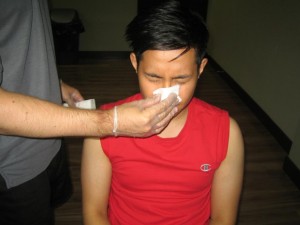Overview
- Allergic rhinitis is a disorder where an allergen affects the inside of your nose.
- This can result in flu-like symptoms, such as sneezing, inflammation, and a congested or runny nose.
- Hay fever is a form of allergic rhinitis that is triggered by pollen. Allergic rhinitis might also be triggered by other allergens, including animal fur and dust mites.
The Symptoms Of Allergic Rhinitis
- Sneezing;

Allergic rhinitis is a disorder where an allergen makes the inside of your nose become swollen. - Runny nose;
- Inflamed nose;
- Congested nose; and
- Many individuals will also have irritated eyes or throat.
The indications of allergic rhinitis usually begin soon after being in contact with an allergen. Some individuals only get allergic rhinitis during certain months as they are sensitive to allergens (such as pollen) that are only created during certain periods of the year.
Other people experience the disorder through the year because they are allergic to non-seasonal allergens, like dust mites.
Most individuals with allergic rhinitis acquire mild symptoms that can be easily and successfully treated. Though, for some, the symptoms can be more serious and insistent, causing complications.
Medication
Medicine will not cure your allergy, but it can help the common symptoms of an allergy, such as a runny nose, inflamed lips and sneezing.
Management for allergic rhinitis is usually the same for adults and kids. If you are expecting a baby, you can acquire some antihistamines. It is generally suggested that you use a nasal spray instead of taking pills to reduce any danger to your unborn infant.
Visit your doctor if your symptoms do not react to treatment after two weeks.
